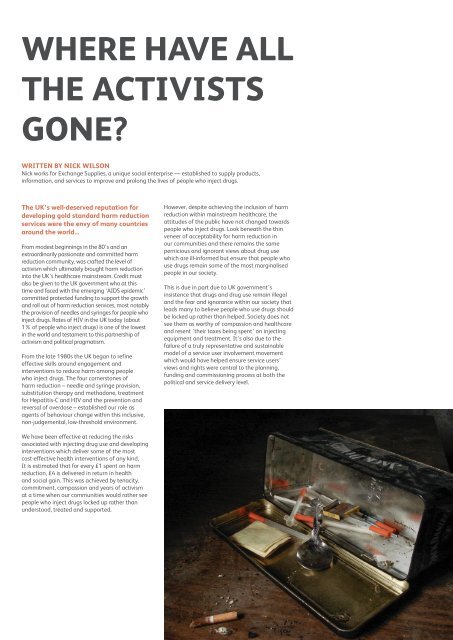The Vision Project
Throughout 2019, Developing Health & Independence (DHI), have been marking their 20th anniversary as a charity by looking to the future. Through articles, events and podcasts, they've asked people to answer the question of how we can achieve their vision of ending social exclusion. This collection of articles includes the contributions of experts from across public life and the political spectrum.
Throughout 2019, Developing Health & Independence (DHI), have been marking their 20th anniversary as a charity by looking to the future. Through articles, events and podcasts, they've asked people to answer the question of how we can achieve their vision of ending social exclusion. This collection of articles includes the contributions of experts from across public life and the political spectrum.
You also want an ePaper? Increase the reach of your titles
YUMPU automatically turns print PDFs into web optimized ePapers that Google loves.
WHERE HAVE ALL<br />
THE ACTIVISTS<br />
GONE?<br />
WRITTEN BY NICK WILSON<br />
Nick works for Exchange Supplies, a unique social enterprise — established to supply products,<br />
information, and services to improve and prolong the lives of people who inject drugs.<br />
<strong>The</strong> UK’s well-deserved reputation for<br />
developing gold standard harm reduction<br />
services were the envy of many countries<br />
around the world...<br />
From modest beginnings in the 80’s and an<br />
extraordinarily passionate and committed harm<br />
reduction community, was crafted the level of<br />
activism which ultimately brought harm reduction<br />
into the UK’s healthcare mainstream. Credit must<br />
also be given to the UK government who at this<br />
time and faced with the emerging ‘AIDS epidemic’<br />
committed protected funding to support the growth<br />
and roll out of harm reduction services, most notably<br />
the provision of needles and syringes for people who<br />
inject drugs. Rates of HIV in the UK today (about<br />
1% of people who inject drugs) is one of the lowest<br />
in the world and testament to this partnership of<br />
activism and political pragmatism.<br />
From the late 1980s the UK began to refine<br />
effective skills around engagement and<br />
interventions to reduce harm among people<br />
who inject drugs. <strong>The</strong> four cornerstones of<br />
harm reduction – needle and syringe provision,<br />
substitution therapy and methadone, treatment<br />
for Hepatitis-C and HIV and the prevention and<br />
reversal of overdose – established our role as<br />
agents of behaviour change within this inclusive,<br />
non-judgemental, low-threshold environment.<br />
However, despite achieving the inclusion of harm<br />
reduction within mainstream healthcare, the<br />
attitudes of the public have not changed towards<br />
people who inject drugs. Look beneath the thin<br />
veneer of acceptability for harm reduction in<br />
our communities and there remains the same<br />
pernicious and ignorant views about drug use<br />
which are ill-informed but ensure that people who<br />
use drugs remain some of the most marginalised<br />
people in our society.<br />
This is due in part due to UK government’s<br />
insistence that drugs and drug use remain illegal<br />
and the fear and ignorance within our society that<br />
leads many to believe people who use drugs should<br />
be locked up rather than helped. Society does not<br />
see them as worthy of compassion and healthcare<br />
and resent ‘their taxes being spent’ on injecting<br />
equipment and treatment. It’s also due to the<br />
failure of a truly representative and sustainable<br />
model of a service user involvement movement<br />
which would have helped ensure service users’<br />
views and rights were central to the planning,<br />
funding and commissioning process at both the<br />
political and service delivery level.<br />
We have been effective at reducing the risks<br />
associated with injecting drug use and developing<br />
interventions which deliver some of the most<br />
cost-effective health interventions of any kind.<br />
It is estimated that for every £1 spent on harm<br />
reduction, £4 is delivered in return in health<br />
and social gain. This was achieved by tenacity,<br />
commitment, compassion and years of activism<br />
at a time when our communities would rather see<br />
people who inject drugs locked up rather than<br />
understood, treated and supported.




